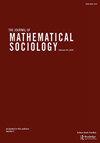人类价值分割的预测评价
IF 1.3
4区 社会学
Q3 MATHEMATICS, INTERDISCIPLINARY APPLICATIONS
引用次数: 1
摘要
数据驱动分割是分析社会调查数据关联模式的重要工具;然而,如何比较不同方法获得的分割质量仍然是一个挑战。我们提出了一个统计框架来量化人类价值分割的质量,通过评估他们预测持有数据的能力。通过比较来自第四轮欧洲社会研究(ESS-4)的人类价值调查数据的聚类,我们表明年龄或国家等人口统计学标记比随机预测更好,但数据驱动的分割方法优于随机预测。我们表明,贝叶斯版本的潜在类分析(LCA)在预测性能上优于标准最大似然LCA,并且对于不同数量的聚类更具鲁棒性。本文章由计算机程序翻译,如有差异,请以英文原文为准。
Predictive evaluation of human value segmentations
ABSTRACT Data-driven segmentation is an important tool for analyzing patterns of associations in social survey data; however, it remains a challenge to compare the quality of segmentations obtained by different methods. We present a statistical framework for quantifying the quality of segmentations of human values, by evaluating their ability to predict held-out data. By comparing clusterings of human values survey data from the forth round of European Social Study (ESS-4), we show that demographic markers such as age or country predict better than random, yet are outperformed by data-driven segmentation methods. We show that a Bayesian version of Latent Class Analysis (LCA) outperforms the standard maximum likelihood LCA in predictive performance and is more robust for different number of clusters.
求助全文
通过发布文献求助,成功后即可免费获取论文全文。
去求助
来源期刊

Journal of Mathematical Sociology
数学-数学跨学科应用
CiteScore
2.90
自引率
10.00%
发文量
5
审稿时长
>12 weeks
期刊介绍:
The goal of the Journal of Mathematical Sociology is to publish models and mathematical techniques that would likely be useful to professional sociologists. The Journal also welcomes papers of mutual interest to social scientists and other social and behavioral scientists, as well as papers by non-social scientists that may encourage fruitful connections between sociology and other disciplines. Reviews of new or developing areas of mathematics and mathematical modeling that may have significant applications in sociology will also be considered.
The Journal of Mathematical Sociology is published in association with the International Network for Social Network Analysis, the Japanese Association for Mathematical Sociology, the Mathematical Sociology Section of the American Sociological Association, and the Methodology Section of the American Sociological Association.
 求助内容:
求助内容: 应助结果提醒方式:
应助结果提醒方式:


